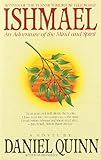“Teacher seeks pupil. Must have an earnest desire to save the world. Apply in person.”
It is this ad near the beginning of Daniel Quinn’s Ishmael that kicks off the fast-paced story. The book was a quick afternoon read for me, as it was interesting enough to continuously compel me to keep turning the page.
The main character responds to the ad and meets a gorilla, Ishmael, who communicates with him telepathically. Ishmael does most of the talking, and slowly prepares his student for his main point, often assigning him “thinking” homework. But the main point he eventually makes is that the world is divided into Takers and Leavers, who are enacting two very different stories about mankind:
“The premise of the Takers’ story is ‘The world belongs to man.’ …The premise of the Leavers’ story is ‘Man belongs to the world.'”
Modern Western Civilization represents the Takers and more primitive tribal cultures represent the Leavers. The conclusion is simple – if we (westernized civilization) keep living the way we are, our species will go extinct. There’s plenty to address here from the perspective of environmental ethics, and almost everything I’ve seen written about this novel explores topics along those themes. But there’s another, less well-known area of philosophy that this book touches upon, and I haven’t seen the connection spelled out anywhere: metaethics.
Most of the time when you hear or read about ethics, you’re hearing that as short hand for normative ethics. Normative ethics seeks to answer questions like “How should I act?” Metaethics, on the other hand, asks questions like “What is goodness?” and “How can we tell what is good from what is bad?”
One particular theory within metaethics is known as moral realism, which posits that the ethics we discuss are about actual, objective things in the world that exist outside of our minds. One particular form of moral realism is ethical naturalism, which holds that these objective things can be known empirically (can be observed). And this is exactly what Ishmael’s law of nature is. He is making the metaethical argument that we can know what is good and bad through observation, and then going on to point out what that law is and making the normative argument that this law tells us how we should act.
In the book, Ishmael says no one spends time thinking about these things. They do, though – and I took an entire course on them in graduate school. But within the field of philosophy these topics are heavily debated, and there are some admittedly dense and complex objections to ethical naturalism and moral realism. What I like so much about Ishmael is that it expresses these ideas in a way that is much easier to understand than philosophical journal articles!
“Of course. The early aeronauts had to proceed by trial and error, because they didn’t know the laws of aerodynamics – didn’t even know there were law.”
“Okay, I see what you’re getting at now.”
“The people of your culture are in the same condition when it comes to learning how they ought to live. They have to proceed by trial and error, because they don’t know the relevant laws – and don’t even know that there are laws.”
“And I agree with them,” I said.
“You’re certain that no laws can be discovered concerning how people ought to love.”
“That’s right. Obviously there are made-up laws, like the laws against drug use, but these can be changed by a vote. You can’t change the laws of aerodynamics by a vote – and there are no laws like that about how people should live.”
“I understand. That’s what Mother Culture teaches, and in this case you agree with her. That’s fine. But at last you have a clear understanding of what I’m attempting here: to show you a law that you will agree is not subject to change by any vote.”
The law Ishmael finally reveals is: You may compete to the fullest extent of your capabilities, but you may not destroy your competitors, destroy their food or deny them access to food. This is the law that he believes can tell us what is good and what is bad, and he makes it clear that Western civilization has gone completely astray from this law. Check out the video below for a bit more explanation.
Whether or not you agree with the law and the environmental message of Ishmael, the story really brings to life a complex branch of philosophy and makes it a lot easier to understand!
Buy Ishmael:



1 comment